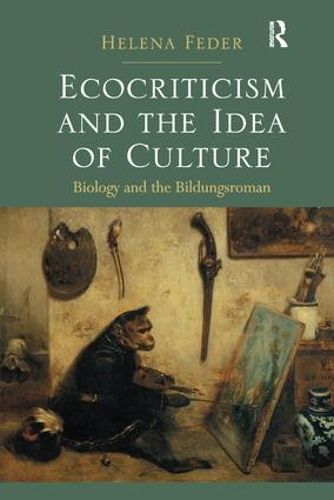Readings Newsletter
Become a Readings Member to make your shopping experience even easier.
Sign in or sign up for free!
You’re not far away from qualifying for FREE standard shipping within Australia
You’ve qualified for FREE standard shipping within Australia
The cart is loading…






Ecocriticism and the Idea of Culture: Biology and the Bildungsroman draws on work by Kinji Imanishi, Frans de Waal, and other biologists to create an interdisciplinary, materialist notion of culture for ecocritical analysis. In this timely intervention, Feder examines the humanist idea of culture by taking a fresh look at the stories it explicitly tells about itself. These stories fall into the genre of the Bildungsroman, the tale of individual acculturation that participates in the myth of its complete separation from and opposition to nature which, Feder argues, is culture’s own origin story. Moving from Voltaire’s Candide to Mary Shelley’s Frankenstein and from Virginia Woolf’s Orlando to Jamaica Kincaid’s Lucy, the book dramatizes humanism’s own awareness of the fallacy of this foundational binary. In the final chapters, Feder examines the discourse of animality at work in this narrative as a humanist fantasy about empathy, one that paradoxically excludes other animals from the ethical community to justify the continued domination of both human and nonhuman others.
$9.00 standard shipping within Australia
FREE standard shipping within Australia for orders over $100.00
Express & International shipping calculated at checkout
Ecocriticism and the Idea of Culture: Biology and the Bildungsroman draws on work by Kinji Imanishi, Frans de Waal, and other biologists to create an interdisciplinary, materialist notion of culture for ecocritical analysis. In this timely intervention, Feder examines the humanist idea of culture by taking a fresh look at the stories it explicitly tells about itself. These stories fall into the genre of the Bildungsroman, the tale of individual acculturation that participates in the myth of its complete separation from and opposition to nature which, Feder argues, is culture’s own origin story. Moving from Voltaire’s Candide to Mary Shelley’s Frankenstein and from Virginia Woolf’s Orlando to Jamaica Kincaid’s Lucy, the book dramatizes humanism’s own awareness of the fallacy of this foundational binary. In the final chapters, Feder examines the discourse of animality at work in this narrative as a humanist fantasy about empathy, one that paradoxically excludes other animals from the ethical community to justify the continued domination of both human and nonhuman others.